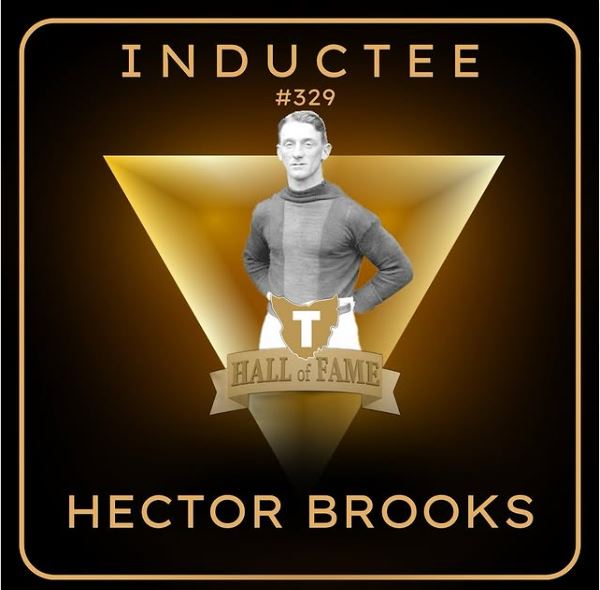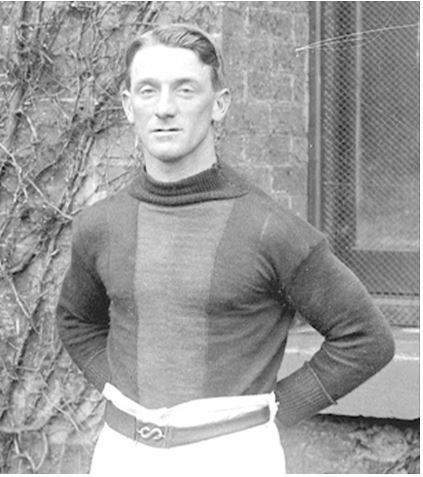Late Great Hector Brooks MM
- The Top Ender Magazine
- Apr 30, 2025
- 3 min read
AFL Tasmania is pleased to announce the next new inductee to the Tasmanian Football Hall of Fame, undoubtedly one of Tasmania’s greatest rovers, Hector Brooks.
Born in 1894, Brooks was educated at the Hobart Central State School where he developed an outstanding early reputation, captaining the school team and representing the south in many intrastate schoolboy matches.
His earliest taste of men’s football came via junior club Standfast in 1912, during which time he declined an offer to play with TFL club North Hobart, followed by a season in NSW playing with prominent Sydney club Newtown.
Brooks enlisted upon the outbreak of the First World War and served on the western front with distinction, rising to the rank of Sergeant and being awarded a Military Medal for bravery.
He nevertheless managed to maintain an involvement with football, captaining the 12th Battalion Team and playing in an AIF 1st Division combined side.
Brooks returned to Hobart post-war and joined North Hobart in 1920, the now-26-year-old quickly establishing himself as one of the most brilliant players in Southern football.
Despite his, as it was put at the time, “Lilliputian stature” of 5’2” (157cm), he was a key member of North Hobart’s TFL and State premiership sides of 1920 and 1923, forming a famous partnership with fellow champion Jack Dunn and winning North Hobart’s trophy for ‘Most Consistent’ in seven consecutive seasons.
Naturally an automatic selection in TFL combined sides, Brooks starred in the famous win over South Australia at Adelaide in 1923, while at home he was three times named as Best on Ground in intrastate contests.
In addition, Brooks represented Tasmania in seven games across the 1924 (Hobart) and 1927 (Melbourne) National Carnivals, more than holding his own against the mainland’s best rovers.
Brooks played his final football match in 1930 at the age of 36 and subsequently took up field umpiring, officiating junior and country matches for nearly a decade while still occasionally strapping on the boots in charity matches. He remained a passionate football - and North Hobart - fan well into his later years, passing away aged 90 in 1984.
A legend of the North Hobart Football Club, his selection in the Demons’ official Team of the Century 16 years later was thoroughly deserved.
Hector Brooks was honoured alongside his fellow Hall of Fame inductees at AFL Tasmania’s night of nights in February this year.
Extracted from AFL TASMANIA
Extracted from State Library of South Australia

Service Number: 3921
Enlisted: 25 August 1915
Born: 8 May 1894
Hometown: Hobart, Tasmania
Occupation: Labourer
Died: Glenorchy Tasmania, 19 September 1984, aged 90 years.
Hector Brooks of Hobart, Tasmania, enlisted when he was 21 years of age on 25 August 1915. He served with the 12th Battalion and his brother, 3920 Pte Leslie John Brooks, who joined the same unit, was killed in action at Pozieres on 19-22 August 1916. They were the sons of David and Elizabeth Brooks of Hobart, Tasmania.
During 1918, Hector was awarded a Military Medal, his recommendation stating, ‘During operations at Proyart on 25 August 1918, Lance Corporal Brooks, when acting as a linesman from Company Headquaters to Battalion Headquarters, displayed great bravery. The wires were frequently cut by shell fire and this NCO, showing an utter disregard of danger repaired them and kept up communication despite the heavy fire.’
Hector was promoted to the rank of Sergeant on 19 November 1918 and returned to Australia during late 1919.
Hector was a promising junior footballer prior to the war and went on with it after the war, although he was almost 26 years of age when he resumed playing for the North Hobart Football Club. The Hobart News reported during 1925, under the heading: “NORTH HOBART’S PLUCKY ROVER, SERGT, HECTOR BROOKS M.M.”
Before going away to war, Hector was chosen as captain of the 12th Battalion football team. In 1918, he played in the 1st Division combined team which won a test against the remaining five divisions of the AIF. He was one of only two Tasmanian’s in the team. Through France and Flanders, Brooks survived fighting and playing football and won without a scratch.
He was reported to have said, “I was too little, they missed me every time.” Brooks was 5 foot three inches on his attestation form and about 61 kilograms in today’s weight measure.
In August 2000, Hector Brooks was included in the official North Hobart ‘Team of the Twentieth Century’.
Thank you for your service and sacrifice – Lest We Forget.
Extracted from Australian War Memorial & National Archives of Australia











